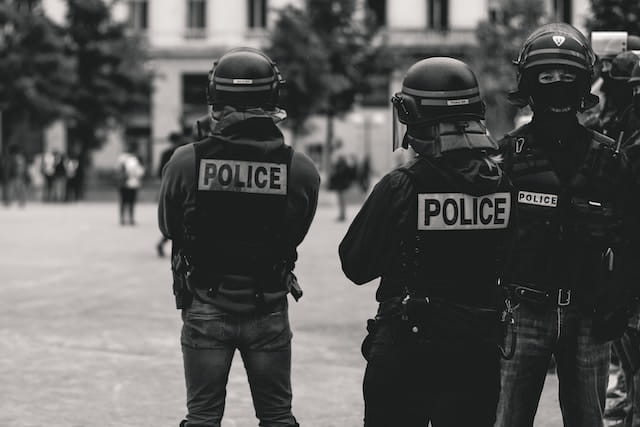
Why would police raid a house?
Police may raid a house for several reasons, all typically rooted in law enforcement objectives aimed at preventing, investigating, or stopping criminal activities. Here are some of the primary reasons why police would conduct a raid on a house:

To Execute a Search Warrant: If police have obtained a search warrant from a judge, it means they have presented enough evidence to establish probable cause that evidence of a crime is present in the location. Search warrants specify what the police are searching for, whether it’s drugs, illegal weapons, evidence of financial crimes, or anything illegal or related to a criminal investigation.
To Arrest a Suspect: If law enforcement believes a suspect in a crime is residing in or using a property, they might raid the house to make an arrest. This usually requires a warrant for the arrest of the individual, unless exigent circumstances exist.
Exigent Circumstances: There are situations where police can conduct a raid without a warrant if there are exigent circumstances. These include scenarios where waiting to obtain a warrant would likely result in the destruction of evidence, escape of suspects, or immediate harm to others. Examples might include active situations like hostage scenarios or when someone’s life is in immediate danger.
To Prevent Imminent Danger: If police have credible information that there is an immediate threat emanating from a property—such as a bomb threat, a planned terrorist attack, or ongoing domestic violence—they may raid the house to prevent harm.
To Disrupt Ongoing Criminal Activities: For ongoing criminal operations, such as drug manufacturing labs, human trafficking operations, or illegal gambling rings, police may conduct a raid to disrupt the activities, seize evidence, and arrest those involved.
To Seize Illegal Items: Raids are also conducted to seize illegal items that are not permitted under the law, such as unlicensed firearms, narcotics, counterfeit money, or stolen property.
To Gather Evidence: In addition to seizing illegal items, raids can be a method to gather evidence critical to ongoing investigations. This might include computer files, documents, or any other material that could link suspects to criminal activities or provide leads in a case.
To Demonstrate Police Presence: In areas where criminal activities are rampant, a police raid can also serve as a show of force, signaling to criminals that law enforcement is active and vigilant in the community.
It’s important to note that the legality and justification of a police raid are governed by strict legal standards, primarily to protect the rights of individuals from unreasonable searches and seizures under the Fourth Amendment of the United States Constitution. Police must usually obtain a valid search warrant based on probable cause, except in the specific situations mentioned where exigent circumstances are present.

In the unsettling event of a police raid at your home, the whirlwind of emotions and questions can be overwhelming. Especially when law enforcement officers leave empty-handed, you might find yourself pondering over what just happened and what it means for your future. Understanding the legalities surrounding search warrants, your rights, and the implications of a raid without evidence is crucial in navigating this complex situation. This article aims to shed light on the aftermath of police raids that yield no findings, offering guidance to ensure your rights are protected and to provide clarity in a stressful situation.
The Legal Framework of Police Raids
When law enforcement officers knock on your door with a search warrant in hand, it signifies they have been granted legal authority by a judge to search your premises for evidence related to a crime. This legal document is obtained only after proving probable cause, a cornerstone principle of the Fourth Amendment of the United States Constitution, designed to protect citizens from unreasonable searches and seizures. However, the question arises: what happens if the police raid your house and find nothing?
Understanding Your Rights
During a police search, knowing your rights is your first line of defense. Key rights include:
The Right to Remain Silent: To avoid self-incrimination, you have the right to remain silent. Politely declining to answer questions without legal counsel present can safeguard you from inadvertently providing information that could be used against you.
The Right to See the Warrant: Always ask to see the search warrant. It should specify the areas to be searched and the items sought. This is your right and a critical step in ensuring the legality of the raid.
Immediate Aftermath of a Fruitless Raid
If law enforcement officers leave without seizing any items or evidence, it might feel like a victory, but it’s important to remain cautious. Here’s what you should do:
Seek Legal Advice: Consulting with an experienced lawyer can help you understand the implications of the raid and any potential next steps.
Document the Raid: Note the date, time, badge numbers of the officers involved, and any damages to your property. This information could be crucial in any future legal actions.
The Process of Obtaining Search Warrants
Understanding how police obtain search warrants can demystify the process and help you recognize your legal standings. Law enforcement must present enough evidence to a judge to demonstrate probable cause. This system is designed to balance law enforcement’s needs with individuals’ privacy rights, ensuring that searches are justified and lawful.
Protecting Your Rights and Property
Protecting your rights and property in the face of a police raid involves several critical steps:
Never Consent to a Search Without a Warrant: Giving police entry without a warrant can complicate matters. Always insist on seeing a valid search warrant.
Stay Calm and Compliant: While asserting your rights, it’s essential to remain calm and not obstruct the police during their search.
FAQs
Q: Can police raid your house without evidence?
A: Police need a valid search warrant, which requires probable cause, to conduct a raid. There are exceptions, such as difficult circumstances, but the courts closely scrutinize these.
Q: What should I do if I think the raid was illegal?
A: Seek legal advice immediately. An experienced lawyer can review the circumstances of the raid and advise on any possible legal actions.
Q: How can I find the best defense attorney if I need one?
A: Look for attorneys with experience in cases similar to yours, check their track records, and consider scheduling a free consultation to discuss your situation.
Q: What happens after the police leave?
A: It’s crucial to document everything about the raid and seek legal counsel to discuss the potential implications and next steps.
Q: Does a fruitless raid affect my criminal record?
A: Simply being the subject of a raid does not result in a criminal record. However, it’s important to address any underlying issues that led to the raid with legal assistance.
Conclusion
A police raid can be a harrowing experience, leaving the person whose premises were searched grappling with uncertainty and concern. Even when such a raid concludes with no property seized, the impact of having your home or office invaded by law enforcement cannot be understated. It’s a matter that goes beyond the immediate stress of the search; it touches on the very essence of one’s sense of security and privacy.
When your home is raided, the experience can linger long after the police officers have left. The knowledge that your personal space has been scrutinized by a police officer, perhaps based on information or suspicion outlined in a search warrant, can be unsettling. The fact that nothing was seized during the raid might offer some solace, but it doesn’t erase the invasion of privacy or the potential damage to your reputation within the community.
Understanding the legal nuances of a police raid is crucial. The issuance of a search warrant is a serious legal action, implying that a judge was convinced there was enough probable cause to authorize police officers to search your premises. This process, while intended to uphold the law, can feel invasive and intimidating to the person at the center of the search.
In the aftermath of a raid where nothing is seized, it’s essential to reflect on the importance of legal counsel. An experienced attorney can offer guidance on how to navigate the complexities that follow a police raid, ensuring that your rights are protected and that you are prepared for any potential legal challenges ahead. They can also assist in addressing any lingering issues that may have led to the police raid, helping to prevent future incidents.
Ultimately, if your property is raided and nothing is seized, it marks a critical moment to reassess and fortify your legal standing. It’s a clear indicator of the need to understand the full scope of your rights and the proper procedures law enforcement must follow. Whether you’re seeking to clear your name, address potential misunderstandings, or simply wish to protect your privacy, the guidance of a skilled lawyer is invaluable. In navigating the aftermath of a police raid, remember that knowledge, legal advice, and calm, measured actions are your best allies. Know your legal rights if police raided your property.

